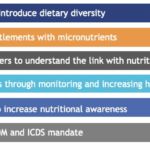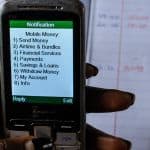How Inclusive Finance Can Address the World’s Most Fundamental Challenge: Food Security, Nutrition and the European Microfinance Award 2023
In the mid-20th century, American agronomist Norman Borlaug pioneered enormous advances in disease resistance and crop yields, launching the “Green Revolution” that revolutionized food production and fed the world, for which he won a Nobel Peace Prize in 1970. Since then, the world has theoretically had enough food to adequately meet its people’s needs — although in practice those needs have never been met, primarily because of misallocation of resources. But there is a real and growing fear in development circles that progress toward global food security has stopped — and in fact reversed. Indeed, according to the World Food Programme, the world is facing “a food crisis of unprecedented proportions.” As the Food and Agriculture Organization pointed out in its 2022 State of Food Security and Nutrition in the World report, global food insecurity had grown by 150 million people since the onset of the COVID-19 pandemic, due to “conflict, climate extremes and economic shocks, combined with growing inequalities.” Moreover, e-MFP’s own Financial Inclusion Compass 2022 shows the same serious concerns among our survey respondents.
These fears are understandable: Access to reliable and adequate food is so fundamental that it defines who you are — your prosperity, prospects, hopes and resilience. If this basic need is not met, all other human development objectives are virtually moot.
So what does food (in)security mean? For one thing, it’s seldom binary: Low-income and vulnerable people are rarely either just food “secure” or “insecure.” Food insecurity is a complex phenomenon that comprises various dimensions and presents as a negative feedback loop: Poverty leads to food insecurity, which can cause poor physical and cognitive development, which can restrict productivity, which in turn exacerbates poverty in an ongoing cycle. And while there are over 800 million people who are hungry or starving, there are over 1 billion more who suffer from what has been called “hidden hunger,” struggling with poor nutrition and unreliable access to adequate food.
However, to describe this challenge purely in terms of access is too narrow. As the Food and Agriculture Organization frames it, food security has at least four dimensions, which include:
- Availability: the supply of food, which depends on domestic food production, imports, food stocks and food aid keeping pace with population growth;
- Access: people’s ability to buy or grow the food they need to thrive;
- Utilization: people’s knowledge about nutritious food choices and preparation, and also the nutritional content and safety of food; and
- Stability: which requires all of the other dimensions to be upheld over time — something that is threatened by severe weather events, price fluctuations and political conflict, among other challenges.
Adding to this complexity, there are multiple factors that impede or promote these dimensions. At the macro level, population growth and government policies — including agricultural sector incentives, international trade and transportation infrastructure investment — play a critical role. At the micro level, household food behaviors are influenced by people’s income level and education, social norms, and which foods are affordable and locally available. Between these two levels are the behaviors of all the other actors in the food system, including small-scale and industrial farms, processors, logistics providers, and vendors, among many others.
These drivers of food security are all perennial. But they are exacerbated today by other emerging factors, from global macroeconomic and geopolitical volatility (made worse by the Russian invasion of Ukraine) to the aftershocks of the COVID-19 pandemic — all of which has contributed to worldwide inflation and supply shocks. And of course, climate change increasingly threatens the livelihoods and food systems of the world’s most vulnerable populations as well.
It is clear that food insecurity remains a key global challenge: Tackling it will take the proverbial “village” — not just a single sector or entity. However, it’s also clear that the financial inclusion sector is uniquely placed to reach the populations that are most vulnerable to food insecurity and malnutrition. That’s why we at e-MFP are pleased to announce that the topic of the European Microfinance Award 2023 is “Inclusive Finance for Food Security & Nutrition.”
How inclusive finance can support food security
Food security and financial inclusion are intrinsically related. In fact, the elements of financial inclusion — giving low-income people the ability to plan, save, mitigate shocks, invest and smooth consumption — will typically increase people’s ability to afford and access sufficient, high-quality food. More than that, by working across the food system, inclusive finance organizations can also play a key role in expanding the availability and sustainability of quality food.
Finance is an integral part of food systems — from agricultural credit to farmers preparing for planting, to warehouse finance at harvest time, to weather or crop insurance. Inclusive financial service providers (FSPs) can also coordinate with other actors across the food value chain, including governments, agricultural research institutions, agri supply companies, food processors, transport providers and distributors. At every step, inclusive FSPs can direct their efforts toward making the production of food a more attractive alternative to growing non-food cash crops, while building long-term sustainability and stability in the agriculture sector through measures that encourage adaptation to climate change. Close engagement with food systems also gives FSPs the opportunity to support the production and distribution of nutrient-rich and diverse food products.
Beyond the food value chain, FSPs are well-positioned to support households that are especially vulnerable to food insecurity. As part of their interaction with clients, FSPs may encourage the use of higher-quality foods, including local or indigenous foods that are being supplanted by cheap, low-quality foods — something that can be influenced through education and by supporting projects that make nutritious foods more accessible and affordable. FSPs can even provide direct support, for example, by funding high-nutrition meal programs at schools serving low-income families.
The relationship between food security and inclusive finance can also flow in the opposite direction, since microfinance clients — the un(der)banked and excluded populations that are most affected by inflation, reduced access to food and climate change — often feel pressure to cut their quantity or quality of food when money is scarce. These clients often experience this scarcity when their loan payments are due, which is to say, when they are interacting with FSPs. By recognising and addressing this issue through various approaches, such as paying greater attention to debt stress or offering repayment flexibility, FSPs can provide as important a response to food insecurity as initiatives aimed at increasing food availability and improving nutrition. And of course there is also a huge and positive role for financial services to play in increasing food security, notably by strengthening household resilience in a broader sense through effective and inclusive savings products, income smoothing from loans and transfers, and protection from shocks through insurance products.
The EMA 2023: Putting the focus on Food Security & Nutrition
The European Microfinance Award 2023 on “Inclusive Finance for Food Security & Nutrition” aims to promote these sorts of solutions. Launched on March 15, it seeks to highlight innovations by financial inclusion organizations that safeguard access to quality and affordable food for vulnerable populations, and that increase the resilience of sustainable food systems.
To be eligible, organizations must be: active in the financial inclusion sector, fully operational for at least two years, and based and operating in a Least Developed Country, Low Income Country, Lower Middle Income Country or Upper Middle Income Country, as defined by the Development Assistance Committee for ODA Recipients.
The call for first-round applications is open until April 12, and the multi-stage evaluation process will culminate with the winner of the €100,000 prize (plus the two runners-up, who each win €10,000) being announced during European Microfinance Week in November. All finalists and semi-finalists will be featured in the annual e-MFP Award publication and can benefit from an enormous amount of positive exposure over the course of the process. All information on the topic, eligibility requirements, and application and evaluation processes can be found on the European Microfinance Award website.
In order to reply to any questions that applicant organizations may have when applying to the Award, e-MFP is organizing three Application Guidance sessions this month: an English session on March 28 (register here); a Spanish session also on March 28 (register here); and a French session on March 29 (register here).
We look forward to receiving applications from a diverse array of organizations in the financial inclusion sector that are innovating to ensure that low-income populations have sufficient access to quality and affordable food.
The European Microfinance Award was launched in 2005 by the Luxembourg Ministry of Foreign and European Affairs — Directorate for Development Cooperation and Humanitarian Affairs. It is jointly organized by the Ministry, the European Microfinance Platform (e-MFP), and the Inclusive Finance Network Luxembourg (InFiNe.lu), in cooperation with the European Investment Bank (EIB).
Joana Afonso is a Financial Inclusion Specialist, Sam Mendelson is a Financial Inclusion Specialist, Fernando Naranjo Galindo is a Program Coordinator and Daniel Rozas is a Senior Microfinance Expert at the European Microfinance Platform (e-MFP).
Image credit: Joe Cummings, via the European Microfinance Platform (e-MFP).
- Categories
- Agriculture, Finance, Transportation



